Do you want to know what the Balkans DNA ethnicity is? Find out where the Balkans are located, which countries are included in this region, and more.
Plus, if you don’t have known ancestors from the Balkans region, you will also learn how you might have inherited DNA from this part of the world.
I first became interested in the Balkans region a few years ago when I discovered a relatively close DNA match from Serbia. It is not a part of the world that typically receives a lot of attention from many Americans, since most people in the USA do not have roots in the area.
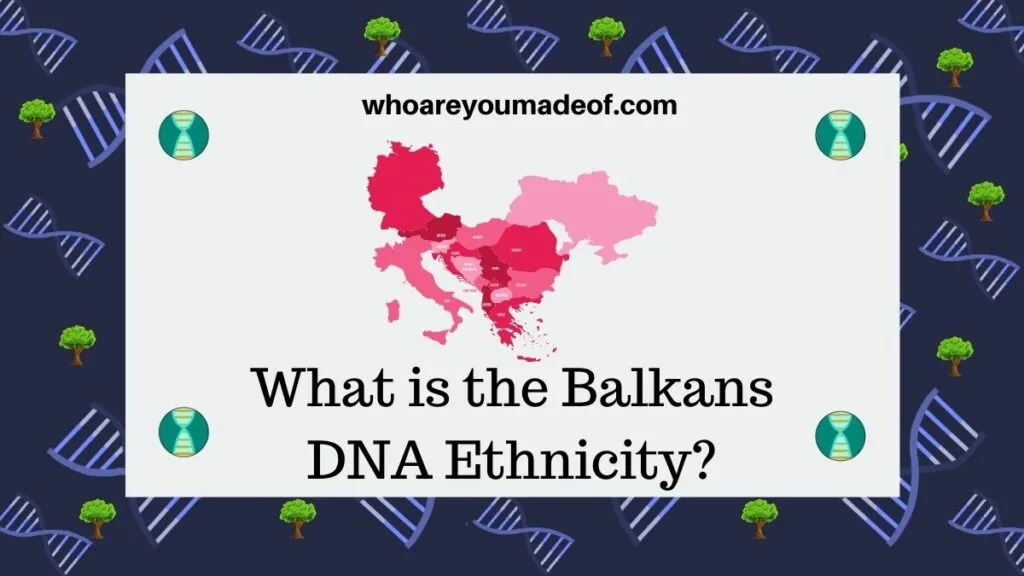
As I learned, Serbia has a large population of ethnic Slovaks who are descended from Slovaks who left the territory that is now Slovakia during the 1700-1800s. When my Slovak ancestors went to New Jersey, most of their cousins and other Slovak countrymen stayed in Europe and ended up in Serbia.
So, my Serbian cousin with Slovak roots is related to me through my mother’s side of the family. Imagine how surprised I was when my father got his Ancestry DNA results back and I learned that I also had a connection to the Balkans through his Eastern European ancestors.
The Balkans is a fascinating part of Europe, and includes many more countries than Serbia. Below, we will explore this region and the Balkans DNA ethnicity.
Where is the Balkans DNA region located?
The Balkan DNA region is bordered by the Adriatic Sea to the west, countries including Romania and Hungary to the North, and the Black Sea to the east. Greece is considered part of the geographic Balkans region, but might be reported separately or together with Balkans DNA on ethnicity estimates.
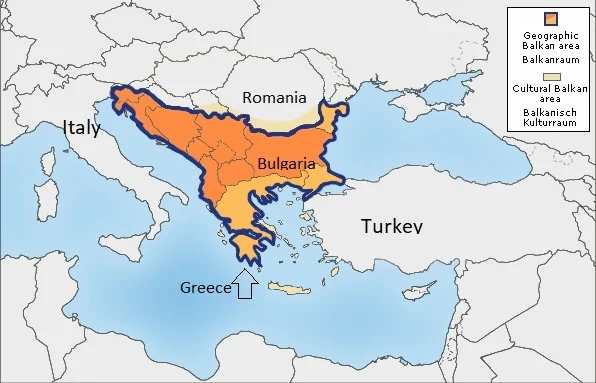
Original image by Perconte Shared with CC BY-SA 2.5 license, I added country labels for reference
Greece’s position on the Mediterranean Sea, as well as linguistic and political differences, has meant that the country is not always considered to be culturally part of the Balkans. Even so, there is a deep historic connection between all of the people on the Balkans Peninsula, which is why some autosomal DNA testing companies report Greece and Balkans DNA together.
The Balkan region is named, as you might have guessed, for the mountain region of the same name. The Balkan Mountain Range stretches from near the Timbok River valley near the border that Serbia and Bulgaria share all the way to the beautiful cliffs at Cape Emine at the Black Sea.
Serbia also has its own share of mountains. In fact, a total of four groups of mountains come together in Serbia. In addition to the Balkan Mountains, we also see the Dinaric, Carpathian, and the Rila-Rhodope systems forming a rugged, formidable geographic boundary separating the region from the rest of Eastern Europe.
Which countries are in the Balkans?
The Balkan DNA ethnicity region typically includes the following: Bosnia and Herzegovina, Bulgaria, Croatia, Montenegro, North Macedonia, Romania, Serbia, and Kosovo. Some DNA testing companies also include Greece as part of the Balkans.
In addition, DNA matching the Balkans region can be found in: Austria, Slovakia, Hungary, Ukraine, and Czech Republic.
What is Balkans ethnicity?
The Balkans is not technically an ethnicity, since there are many distinct ethnic groups living on the Balkan Peninsula. Each of these groups has a unique cultural and linguistic identity, often referred to as an ethnicity.
Some of the largest ethnic groups in the Balkans includes Serbs, Romani, Sephardic and Ashkenazi Jewish, Macedonian, Albanian, Croats, Bulgarians, Bosniaks, and Yugoslavs.
Why Is there Balkans DNA in Other Parts of Europe?
The Balkans has traditionally been a very important part of the cultural exchange between the Slavic countries of Eastern Europe, Greece, and West Asian countries such as Turkey, Syria, Iraq and Iran. This exchange, which usually includes commercial trade, also often leads to people from one region establishing themselves in another.
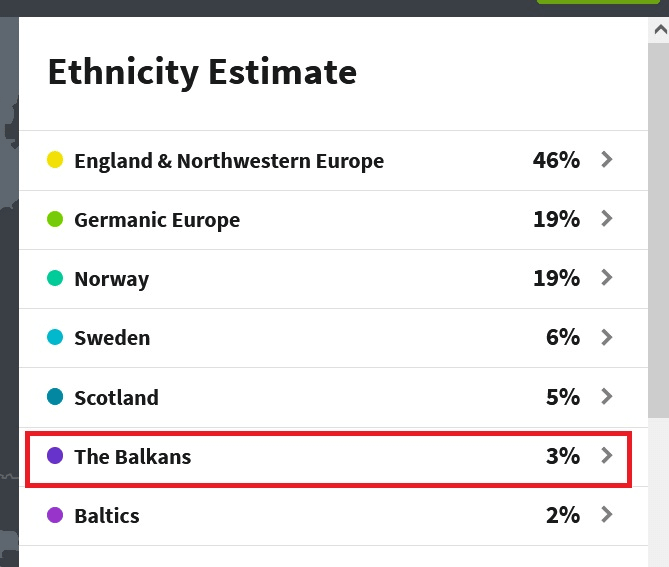
In addition, for more than a thousand years, people have left the Balkans DNA region because of political and economic difficulties due to the rough geography in the region and discord between the more than one dozen ethnic groups that call the region home.
This means that many people from the Balkans DNA region ended up in other parts of Europe. Since this migration has been occurring for many hundreds of years, many of us might find that our ancestors from Germany, Slovakia, Poland, or Austria, may have had ancestors from the Balkan Peninsula.
For example, even though my father’s side of the family has no known ancestors from any of the present-day Balkan countries that I listed above, his paternal uncle clearly matches the Balkan DNA region:
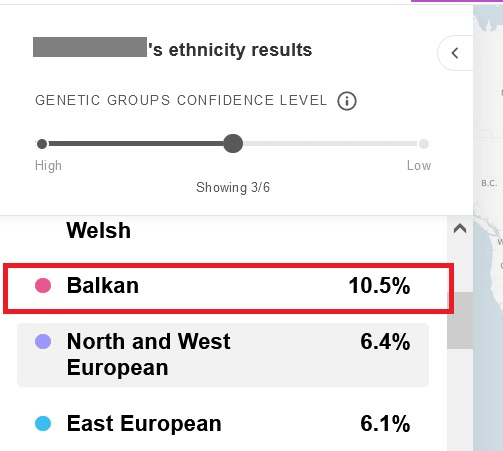
In addition, both my father and his uncle have a great number of DNA matches on sites like MyHeritage. For example, my great-uncle has at least 106 DNA matches, all with more than 75% of their DNA matching the Balkans, who are from the countries mentioned in the previous section of this article as part of the Balkans DNA geographic region.
More research is certainly needed, but I feel confident that my Balkans ancestors must have left the peninsula within the past few hundred years to migrate to a country such as Germany.
How to find out if you have Balkans DNA
Family Tree DNA, AncestryDNA, 23andMe, and MyHeritage DNA all report a specific region matching the Balkan ethnicity on their ethnicity estimates or ancestry reports. If you haven’t already tested your DNA, any of the companies that are mentioned here are excellent choices for discovering your heritage in the Balkans region.
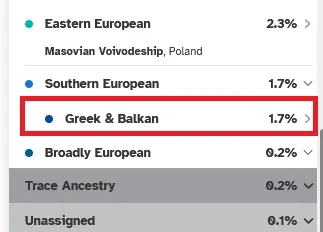
Conclusion
I hope that this post has helped you understand more about the Balkan DNA ethnicity and what it means to have this region in your results. It is a fascinating part of the world with a rich cultural history.
If you have any questions about something that you read in this post, or if you would like to share your own experience exploring your roots in the Balkans, please join in the discussion below.
Thanks for reading today!

AlekD
Tuesday 22nd of August 2023
Kosovo is in Serbia my dear friend. Refer to UN list of member states
Mercedes
Sunday 27th of August 2023
Hi! I realize that the Kosovo region is disputed by some, but I am going off a list of countries recognized by the US State Department. Kosovo is also recognized by many countries in the European Union. My intention here is to not be involved in international politics (yikes!), but to help people learn about their ancestry. Thus, people who live in Kosovo, regardless of who is in charge there, will generally have their DNA results show up as the Balkans. I appreciate the chance to clarify this!! Sincerely, Mercedes
Kristina Gradishar
Friday 7th of October 2022
Slovenians also have Balkan DNA. Atleast 1/3 of the country is considered Balkan and they are often included in Balkan country groupings. My uncle (100% Slovene) has 25% Greek or Balkan DNA according to FamilyTreeDNA
Perparim Elezi
Thursday 19th of May 2022
Sorry, but looks you have no real idea and knowledge on Balkan. That's bad, as many people going to read some opinions who are not true.
Regards,
Pamela Rice
Tuesday 4th of January 2022
I just got my DNA results back and I'm 50% Balkan I was told I was English and German, wow whata surprise.
Barbara
Wednesday 10th of November 2021
My mother's grandmother claimed they were Magyars from Sopron, Hungary. My brothers DNA test revealed 24% Balkan, and 2% Russian. I believe the Magyars are from Russia, but Hungary usually is not included among Balkan countries. Can you explain this?
Albert
Sunday 26th of November 2023
@Barbara, I can't explain to you. I'm 9.9% Balkan origin by myheritages DNA test. My ancestors lived in Miskolc and upper Hungary today Slovakia.